高中英语语法-倒装
高中英语语法倒装句总结讲解

高中英语语法倒装句总结讲解1. 完全倒装:即将谓语动词的全部置于主语之前。
常见用法:1) 当here, there, in, ou t, up, down, on 等副词置于句首,且主语为名词时;2) 将表示地点、方位的介词短语置于句首;3) 直接引语置于句首,其后的主语是名词时。
2. 部分倒装:即将谓语动词的一部分置于主语之前(如助动词be, do, have, will,和情态动词may, can, must, should 等)。
常见用法:1) 否定词或词组,如neither, nor, never, nowhere, not, seldom, rarely, scarcely, barely, hardly, no sooner, at no time, in no case, in no way, by no means, on no condition 等置于句首时;2) so 表示“也”,neither/ nor表示“也不”;so / such… that 表示“那样……以至于”置于句首时;3) only + 状语/ 状从,置于句首时, 主句要部分倒装;注意:当only + 主语置于句首时,则用正常语序。
4) not only … but also…引导两个分句时,not only 引导的分句要部分倒装;5) not until + 状语/ 状从,“直到……才”,置于句首时,主句要部分倒装;6) adj. / adv. / n. / v. / 分词+ as / though + 主语+ 谓语:引导让步状从,置于句首时;7) 在虚拟语气的条件句中,如含should, had, were, 可将它们置于句首,且省略if;8) 用于:May + 主语+ v. 结构中,表示“祝愿”;9) 表示次数、频率的副词置于句首时(也可用正常语序)。
倒装句口诀:副词开头要例装,人称代词则如常。
only修饰副介状,位于句首半倒装。
高中英语语法 倒装句语法课件(共63张PPT)
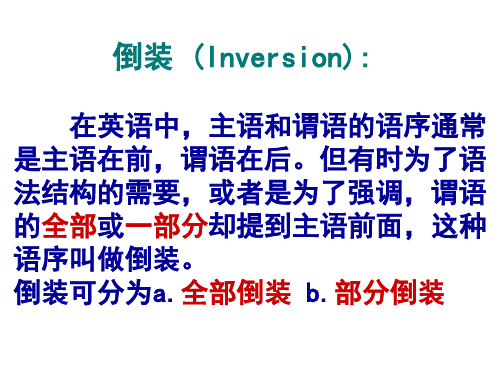
B 3. (2005江苏) ________ about wild plants that they decided to
make a trip to Madagascar for further research.
A. So curions the couple was B. So curious were the couple
open.
A. Try as she might
B. As she might try
C. She might as try
D. Might she as try
33. __D____, the boy knows a lot about computer.
A. Though is he young B. As is he young
3) 介词短语+be+主语 Among the goods are Christmas trees, flowers and toys.
6. 为了保持句子平衡或为了强调表语或状语,为 了使上下文紧密衔接。
a. inside the pyramids are the burial rooms for the s and queens.
如果后一个句子只是单纯的重复前面句子的意 思,则不倒装。
“It is hot today.” “So it is.”
“He finished it on time.” “So he did.”
当前面的句子中主语、谓语或肯否定形式不同时, 则用so it is with….,或it is the same with …句型来表 示。
A are hanging B hanged C hang D hangs
高中英语倒装句的归纳总结

高中英语倒装句的归纳总结倒装句是英语中的一种特殊语法结构,通常在句子中,主语和谓语动词的位置是固定的,即主语在前,谓语动词在后。
然而,在某些情况下,为了强调句子中的某个成分,或者为了满足特定的语法要求,我们需要将主语和谓语动词的位置颠倒,这就是倒装句。
倒装句在高中英语中经常出现,因此对其进行归纳总结具有重要的意义。
一、全部倒装全部倒装是指句子中的主语和谓语动词完全颠倒的情况,常见于以下几种情况:1. 在以副词here, there或者out, in等表示地点的副词开始的句子中,常常采用全部倒装。
Here comes the bus.(汽车来了。
)There goes the bell.(铃声响了。
)Out rushed the children.(孩子们冲了出去。
)2. 在以表示方向的副词和介词短语开头的句子中,常采用全部倒装。
Down went the sun.(太阳下山了。
)In came the teacher.(老师进来了。
)3. 在以表示否定意义的副词或副词短语开头的句子中,常采用全部倒装。
Never have I seen such a beautiful view.(我从未见过如此美景。
)Not only does he play basketball, but he also plays football.(他不仅打篮球,还踢足球。
)二、部分倒装部分倒装是指只将谓语动词和助动词或情态动词提到主语之前,而将其他成分保持原来顺序的情况。
常见的部分倒装有以下几种情况:1. 在以表示否定意义的副词或副词短语位于句首时,动词与主语之间采用部分倒装。
Never have I been to Paris.(我从未去过巴黎。
)Hardly had she finished her speech when they clapped.(她刚刚讲完演讲就被他们鼓掌了。
)2. 在以so和neither引导的倒装句中,动词与主语之间采用部分倒装。
高中英语语法倒装总结全
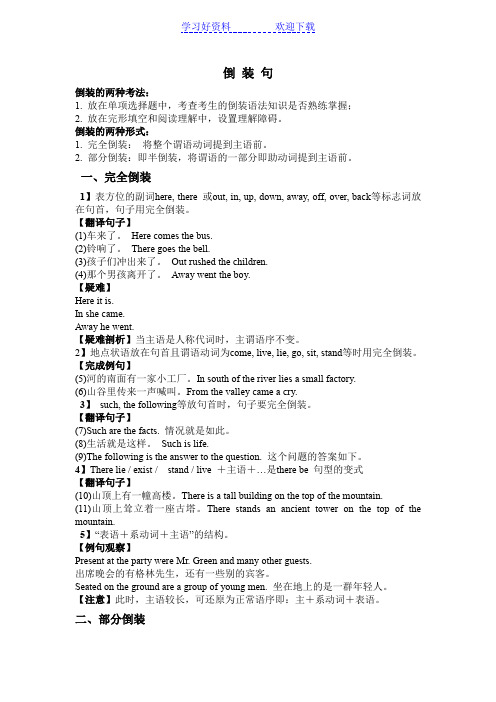
倒装句倒装的两种考法:1. 放在单项选择题中,考查考生的倒装语法知识是否熟练掌握;2. 放在完形填空和阅读理解中,设置理解障碍。
倒装的两种形式:1. 完全倒装:将整个谓语动词提到主语前。
2. 部分倒装:即半倒装,将谓语的一部分即助动词提到主语前。
一、完全倒装1】表方位的副词here, there 或out, in, up, down, away, off, over, back等标志词放在句首,句子用完全倒装。
【翻译句子】(1)车来了。
Here comes the bus.(2)铃响了。
There goes the bell.(3)孩子们冲出来了。
Out rushed the children.(4)那个男孩离开了。
Away went the boy.【疑难】Here it is.In she came.Away he went.【疑难剖析】当主语是人称代词时,主谓语序不变。
2】地点状语放在句首且谓语动词为come, live, lie, go, sit, stand等时用完全倒装。
【完成例句】(5)河的南面有一家小工厂。
In south of the river lies a small factory.(6)山谷里传来一声喊叫。
From the valley came a cry.3】such, the following等放句首时,句子要完全倒装。
【翻译句子】(7)Such are the facts. 情况就是如此。
(8)生活就是这样。
Such is life.(9)The following is the answer to the question. 这个问题的答案如下。
4】There lie / exist / stand / live +主语+…是there be 句型的变式【翻译句子】(10)山顶上有一幢高楼。
There is a tall building on the top of the mountain.(11)山顶上耸立着一座古塔。
高中英语语法全解-倒装
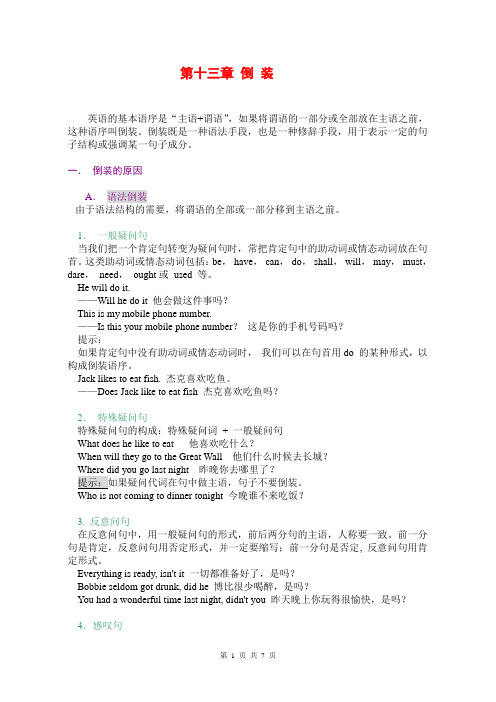
第十三章倒装英语的基本语序是“主语+谓语”,如果将谓语的一部分或全部放在主语之前,这种语序叫倒装。
倒装既是一种语法手段,也是一种修辞手段,用于表示一定的句子结构或强调某一句子成分。
一.倒装的原因A.语法倒装由于语法结构的需要,将谓语的全部或一部分移到主语之前。
1.一般疑问句当我们把一个肯定句转变为疑问句时,常把肯定句中的助动词或情态动词放在句首。
这类助动词或情态动词包括:be,have,can,do,shall,will,may,must,dare,need,ought或used 等。
He will do it.——Will he do it 他会做这件事吗?This is my mobile phone number.——Is this your mobile phone number?这是你的手机号码吗?提示:如果肯定句中没有助动词或情态动词时,我们可以在句首用do 的某种形式,以构成倒装语序。
Jack likes to eat fish. 杰克喜欢吃鱼。
——Does Jack like to eat fish 杰克喜欢吃鱼吗?2.特殊疑问句特殊疑问句的构成:特殊疑问词+ 一般疑问句What does he like to eat 他喜欢吃什么?When will they go to the Great Wall 他们什么时候去长城?昨晚你去哪里了?今晚谁不来吃饭?3. 反意问句在反意问句中,用一般疑问句的形式,前后两分句的主语,人称要一致。
前一分句是肯定,反意问句用否定形式,并一定要缩写;前一分句是否定, 反意问句用肯定形式。
Everything is ready, isn't it 一切都准备好了,是吗?Bobbie seldom got drunk, did he 博比很少喝醉,是吗?You had a wonderful time last night, didn't you 昨天晚上你玩得很愉快,是吗?4.感叹句英语中的感叹句有时也通过倒装的形式来表达。
高中英语语法倒装句

1.His mother had talked to him for many minutes while he was watching TV, but ____. A. a little did he hear B. little did he hear C. little heard he D. a little heard he 2.—— Hello, Zhu Hua. I’ll have to return to Canada because I’ve worked here for a year. —— _____! What time flies B. How time flies C. What does time fly D. How does time fly 3. During the war, ____but also he lost his wife and his child. not was his job in the lab taken away B. not only was his job in the lab taken away C. not merely his job in the lab was taken away D. not just was taken away his job in the lab
C
D
11.— The old man wouldn’t stay at home for a rest even if it rained. — ____.He would feel sick if he stayed home for one day. A. So would my grandpa B. So wouldn’t my grandpa C. Neither would my grandpa D. Nor wouldn’t my grandpa 12.___for us to surf (冲浪) on the sea in summer! A. What exciting is it B. How exciting is it C. What exciting it is D. How exciting it is 13.By no means ___ to our plan for the trip. A. will she agree B. she will agree C. agrees she D. will agree she
高中英语知识点归纳倒装句的用法总结

高中英语知识点归纳倒装句的用法总结高中英语知识点归纳:倒装句的用法总结倒装句是英语语法中的一种特殊语法结构,常见于各种语言形式中。
倒装句通常在句子中,把谓语动词放在主语之前,从而改变了正常语序。
在英语学习中,倒装句是一个重要的知识点,掌握了它的基本用法,可以使我们的表达更加地准确、得体。
本文将对高中英语学习中与倒装句有关的知识进行归纳和总结,以便同学们更好地掌握和运用。
一、完全倒装句完全倒装句是指把整个谓语动词放在主语之前,常用于以下几种情况:1.以副词或介词词组开头的句子:- Never have I seen such a beautiful sunset. 我从未见过如此美丽的日落。
- In front of us stood a tall building. 在我们面前矗立着一座高楼。
2.以表示否定意义的副词开头的句子:- Not only did she forget my birthday, but she also didn't apologize. 她不仅忘记了我的生日,而且也没有道歉。
3.以表示“只有、仅仅、唯一”等意义的副词或词组开头的句子:- Only by working hard can you achieve your goals. 只有通过努力工作,你才能实现自己的目标。
4.以表地点的副词或介词短语放在句首,句子的主语为there时:- There is a cat under the table. 桌子下有一只猫。
- Here comes the train. 火车来了。
二、部分倒装句部分倒装句是指把助动词放在主语之前,常用于以下几种情况:1.以表示否定的词或短语开头的句子,包括never、not、seldom、hardly等:- Never have I seen such a talented musician. 我从未见过如此有天赋的音乐家。
2.以表示“只有、仅仅、唯一”等意义的副词或词组开头的句子,包括only、hardly等:- Only when the sun sets can we see the stars in the sky. 只有太阳下山后,我们才能看到天空中的星星。
高中英语语法倒装句讲解

高中英语语法倒装句讲解倒装句倒装句是英语中常见的一种句式,它的特点是把谓语动词放在主语之前,以达到强调的效果。
在倒装句中,常用的有全部倒装和部分倒装两种形式。
一、全部倒装全部倒装即把整个谓语部分放在主语之前。
当副词here。
there。
in。
out。
up。
down。
away。
back。
then。
ahead,off。
over等位于句首、谓语动词常为be。
come。
go。
follow。
run。
rush。
fly。
fall等不及物动词,而且主语又是名词时,用完全倒装。
注意:此类倒装只限于一般现在时和一般过去式,不用进行时态并且若主语是代词时,不用倒装。
同学们可借助下面的图形速记用于完全倒装的词。
1.介词短语(地点状语)+不及物动词+主语A beautiful girl sits under the tree。
= Under the tree sits a beautiful girl。
树下坐着一位漂亮的女孩。
A big ___ of the lake。
= South of the ___的南边是一个大超市。
A modern swimming pool is located 20 miles east of our school。
= 20 miles east of our school ___。
我们学校向东20英里有一个现代化的游泳池。
Piles of old books。
magazines and newspapers are on the floor。
= On the floor were piles of old books。
magazines and newspapers。
地板上是一堆堆旧的书报杂志。
2.表方向、地点的副词(here。
there。
up。
down。
away)+不及物动词+主语,构成的全部倒装句___ ___ barking fiercely。
away fled the ___。
听到狗的狂叫声,小偷逃掉了。
高中英语倒装句(完整版详细讲义+随堂练习)

Grammar of the Inversion (Module 5 Unit 4)倒装句英语最基本的语序是主语在前, 谓语动词在后。
但有时由于句子结构的需要或表示强调, 就要采用倒装形式。
倒装分两种情况: 1)将谓语动词完全移到主语之前称为完全倒装, 2)只将助动词或情态动词放到主语之前称为部分倒装。
并且强调性倒装和以so, neither, nor开头的句子是高考例题的热点。
一、倒装句的意义1.用倒装构成疑问句,适应一定的语法结构的需要。
.in?Was the People's Liberation Army founded in 1927?2.为了强调某一部分, 而把这部分放到句首, 构成倒装。
t.fo.schoo.thi.term.So early did he come to school that no other students came.二、倒装的用法完全倒装1.在“ther.be”结构里, there是引导词, 主语在be后。
在“there + be”结构中的谓语动词有时不用be , 而用表示类似“存在”观念的其他不及物动词。
如: live, stand, come, lie, flow, enter, rise 和appear等。
e.g.Ther.i..bo.o.th.table.There came shouts for help from the river.There lies a large wheat field in front of the house.Many years ago there lived an old man in the wooden house.2.为了表达生动, 有时把表地点、方位的副词, 如here, there, now , then,, thus ,up, down, out, off, over, away, in等放在句首, 同时把谓语动词放在主语之前, 在here, there等副词开头的某些句子里(要用一般现在时态)。
高中英语知识点归纳倒装句的用法

高中英语知识点归纳倒装句的用法倒装句是英语中的一种常见语法现象,它与一般的语序有所不同。
在倒装句中,谓语动词不再位于句子的中间,而是移到主语之前或状语之前,这种语法结构的运用可以使句子显得更加生动有趣。
下面将对高中英语中常见的倒装句进行归纳总结。
一、完全倒装句完全倒装句是指将助动词、情态动词或系动词放在主语之前,句子的谓语动词则位于主语之后。
完全倒装句的结构为:助动词/情态动词/系动词+主语+谓语动词+其他。
1.助动词完全倒装句助动词包括be动词、have动词和do动词。
当句子以副词here、there或表示方向的副词(如up、down、in、out等)开头时,为了突出地点或方向,可以采用助动词完全倒装的形式。
例如:Here comes the bus.There is a cat under the table.Down came the rain.2.情态动词完全倒装句情态动词包括can、could、may、might、must、shall、should、will、would等。
在表示祝愿、建议、命令等意义时,可以采用完全倒装的形式。
例如:May you have a happy birthday!Should you need any help, feel free to ask.Will you please close the door?3.系动词完全倒装句系动词包括be动词、seem、appear、look、sound等。
在表示位置、方式、状态、主语特征等方面时,可以采用系动词完全倒装的形式。
例如:On the table lies a book.How beautiful the flowers are!Tired as he was, he kept working.二、部分倒装句部分倒装句是指将谓语动词的一部分(通常是助动词或情态动词)与主语之间的位置对调,这种语法结构常见于否定句、选择疑问句和以感叹词开头的句子。
高中英语语法——倒装句

倒装句倒装的原因:①语法原因②强调③平衡句子结构④承上启下完全倒装:整个谓语都在主语之前。
部分倒装:助动词/be/情态动词等放在主语之前。
一、完全倒装:整个谓语都在主语之前1. there be句型(特殊的全部倒装句型):其中be可换为appear, come,exist, happen,lie,live,stand等动词。
[exist/iɡ'zɪst/ vi.存在;生存]There is an experienced teacher and many lovely students in the classroom. 教室里有一位经验丰富的老师和许多可爱的学生。
There stands a temple on the top ofthe mountain. 山顶上有座庙。
2. 将here, there, now, then等地点或时间副词置于句首,且谓语动词是be, come, go, remain, lie, run等,且主语为名词时,用完全倒装。
—Is everyone here? 每个人都在这儿吗?—Not yet ... Look, there come the rest of our guests! 还没有。
看,其余的客人来了。
Here comes my list of dos and don’ts:... 下面是我的行为准则:...Here is some advice for you to follow while listening to his lecture.下面是你听他的报告时可以遵循的一些建议。
3. 表示运动方向的副词out, in, up, down, away等置于句首,谓语是表示运动的动词,且主语为名词时,句子要用完全倒装。
In the dark corner of the room, up jumped the cat and caught the mouse. 在房间黑暗的角落里,那只猫跳了上去并抓住了那只老鼠。
高中英语语法倒装句
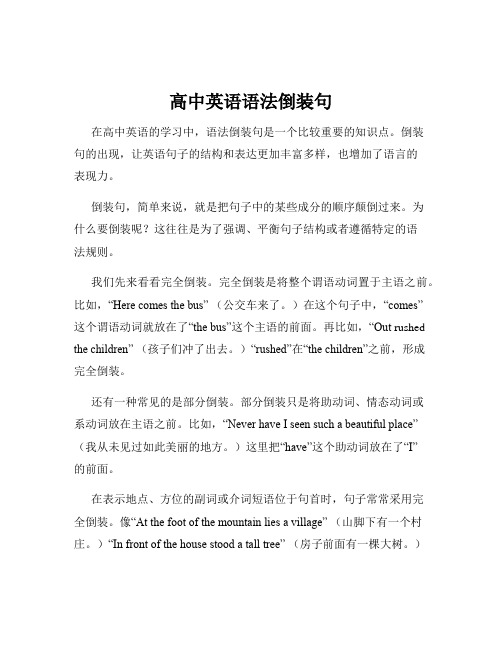
高中英语语法倒装句在高中英语的学习中,语法倒装句是一个比较重要的知识点。
倒装句的出现,让英语句子的结构和表达更加丰富多样,也增加了语言的表现力。
倒装句,简单来说,就是把句子中的某些成分的顺序颠倒过来。
为什么要倒装呢?这往往是为了强调、平衡句子结构或者遵循特定的语法规则。
我们先来看看完全倒装。
完全倒装是将整个谓语动词置于主语之前。
比如,“Here comes the bus” (公交车来了。
)在这个句子中,“comes”这个谓语动词就放在了“the bus”这个主语的前面。
再比如,“Out rushed the children” (孩子们冲了出去。
)“rushed”在“the children”之前,形成完全倒装。
还有一种常见的是部分倒装。
部分倒装只是将助动词、情态动词或系动词放在主语之前。
比如,“Never have I seen such a beautiful place” (我从未见过如此美丽的地方。
)这里把“have”这个助动词放在了“I”的前面。
在表示地点、方位的副词或介词短语位于句首时,句子常常采用完全倒装。
像“At the foot of the mountain lies a village” (山脚下有一个村庄。
)“In front of the house stood a tall tree” (房子前面有一棵大树。
)当一些否定词或具有否定意义的词或短语位于句首时,句子需要部分倒装。
例如,“Never will I forget that day” (我永远不会忘记那一天。
)“Not only did he come, but also he brought us a present” (他不仅来了,还带了礼物给我们。
)“sothat”句型中,当“so +形容词/副词”位于句首时,也会引起部分倒装。
比如,“So fast did he run that I couldn't catch up with him” (他跑得如此快,我都追不上他。
高中英语倒装用法归纳

高中英语倒装用法归纳倒装句是英语中一种常见的句法结构,它与正常的语序相比有所不同,一般将谓语动词或助动词放在主语之前,以强调句子的某个部分或改变句子的语气。
在高中英语中,倒装句的用法较为常见,今天我们就来归纳一下高中英语中的倒装用法。
一、完全倒装1. 在句首置于否定副词“never, seldom, hardly, rarely, little, barely, scarcely”之后,用于表示否定意义的完全倒装。
例如:Never have I seen such a breathtaking view.Seldom does she stay up late.Hardly had I started reading the book when the power went out.2. 在表示地点、时间或方式的副词或短语位于句首时,用完全倒装。
例如:In the garden were beautiful flowers and green trees.At the party came a lot of guests.In the distance can be seen the outline of a mountain.二、部分倒装1. 在以“here, there, now, then”开头的句子中,用部分倒装。
例如:Here comes the bus.There goes the bell.Now is the time for action.Then came the news that we had won.2. 当表示“only, so, nor, neither”等否定意义的词语位于句首时,用部分倒装。
例如:Only in this way can we achieve success.So angry was he that he couldn't speak.Nor did I see any familiar faces in the crowd.Neither have I read the book.3. 当以“never, seldom, rarely”等词作为修饰性状语位于句首时,也可用部分倒装。
高中英语倒装句讲解

高中英语倒装句讲解 Final approval draft on November 22, 2020倒装句讲解英语句子通常有两种语序:一种是陈述语序,一种是倒装语序。
将谓语的一部分或全部置于主语之前的语序叫做倒装语序。
倒装可分为二种:将整个谓语提到主语之前的叫完全倒装(full inversion);而只将be 、情态动词或者助动词放在主语之前的叫做部分倒装(partialinversion)。
形式倒装:只把强调的内容提至句首,主谓并不倒装形式倒装有四类:(1)感叹句:What + a/an + adj +n.+(主语+谓语)!How + adj /adv.+(主语+谓语)!(2)The+比较级+正常语序句子,The+比较级+正常语序句子。
“越……,越…….。
”(3)Whatever+n.+主语+谓语,主句。
However+ adj/adv+主语+谓语,主句。
(4)As/Although引导让步状语从句时,可以对表语、谓语、状语进行强调。
(注意:若对表语进行强调时,表语为单数可数名词,形容词最高级时,要省掉冠词)一、完全倒装1. There be结构。
另外,在此结构中可以用来代替be动词的动词有:exist, seem, happen, appear, live, rise, stand等。
如:There stood a dog before him.There exist different opinions on this question.巩固练习:1) ________ a beautiful palace ________ the foot of the hill.A. There stand; atB. There stands; underC. Stands there; underD. There stands; at2 (1).在以here、there、now、then等副词开头的句子里。
高中英语知识点归纳倒装句的用法及常见情况

高中英语知识点归纳倒装句的用法及常见情况倒装句是英语语法中一个重要的句法结构,它在句子中有特殊的应用。
本文将归纳总结高中英语中关于倒装句的用法及常见情况,以帮助大家更好地理解和运用倒装句。
一、倒装句的基本用法倒装句是指把原本主语和谓语的次序颠倒,使谓语动词或助动词出现在主语之前的一种句法结构。
在英语中,倒装句主要有三种基本形式:全部倒装、部分倒装和助动词倒装。
1. 全部倒装全部倒装是指将整个谓语部分完全颠倒,即将谓语动词或助动词放在主语之前。
常见情况有:在以否定词开头的句子中,当否定副词not,never,hardly,scarcely,little等放在句首时;以及在表示地点、时间或方式的状语从句中。
例1:Not only does he speak English fluently, but he also speaks French.例2:Hardly had I arrived home when it started to rain.例3:In the garden were some beautiful flowers.2. 部分倒装部分倒装是指将助动词,或情态动词,或谓语动词的某些形式移到主语之前。
常见情况包括:带有否定意义的词或短语出现在句首时;含有表示条件的副词或介词短语的句子;以及为了强调某一部分内容。
例4:Never have I seen such a beautiful sunset.例5:Had I known the truth, I would not have told her.例6:Only in this way can we achieve success in our study.3. 助动词倒装助动词倒装是指将助动词提到主语之前,用于疑问句或以so/neither/nor开头的句子,其目的是避免重复。
例7:Do you know him? —— No, I don't.例8:She is reading a book, and so am I.例9:He doesn't like ice cream, and neither do I.二、倒装句的常见情况除了基本的倒装句形式外,倒装句还有一些常见的情况和特殊用法需要掌握。
高中英语语法--倒装句
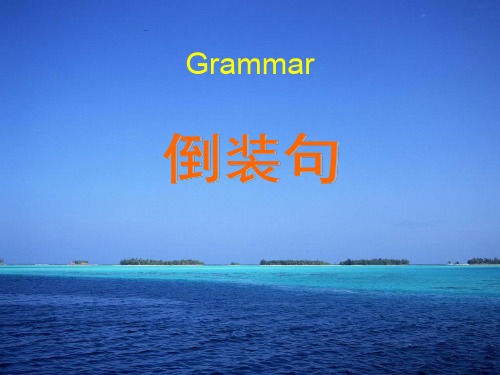
英语句子的自然语序是主语在前,谓语 动词在后。为了强调句中的某一部分把原来的 语序重新调整,通常将助动词、系动词、情态 动词等放在主语之前,称为倒装结构。 全部倒装:把谓语动词提前; 部分倒装:把助动词、情态动词、系动词提前。
一、全部倒装
1.There be 句型表示“存在”时,要倒装,且 be 动词就近一致。其中 be 有时可以用 live, stand, lie, seem, happen, appear, come, remain 等代 替。 There is a cup and two books on the desk. 桌上有一个茶杯和两本书。 There lived a king long long ago. 从前,有位国王。 2.部分副词开头的句子,谓语动词为 be, go, come 等时要倒装。 相应的副词有:here, there, now, then, such; in, out, away, up, down, off.
4.Distinguished guests and friends, welcome to our school. C the ceremony of the 50th Anniversity this morning are our alumni(校友) from home and abroad.(2009江苏) A.Attend B.To attend C.Attending D.Having attended 5.We laugh at jokes, but seldom D about how they work. A. we think B.think we C.we do think D.do we think
Here they are. 他们在这儿。 Away they went. 他们走了。 Over it turns. 它翻过来了。 3.介词短语作状语,位于句首,可以用倒装。 On her left sat her husband.她左边坐着她的丈夫。 Beyond the river lives an old fisherman. 有个老渔夫住在河对岸。 4.直接引语中的倒装 “Give me the book”, the boy said.(正常语 序) “Give me the book”, said the boy.(倒装)
高中英语语法倒装句
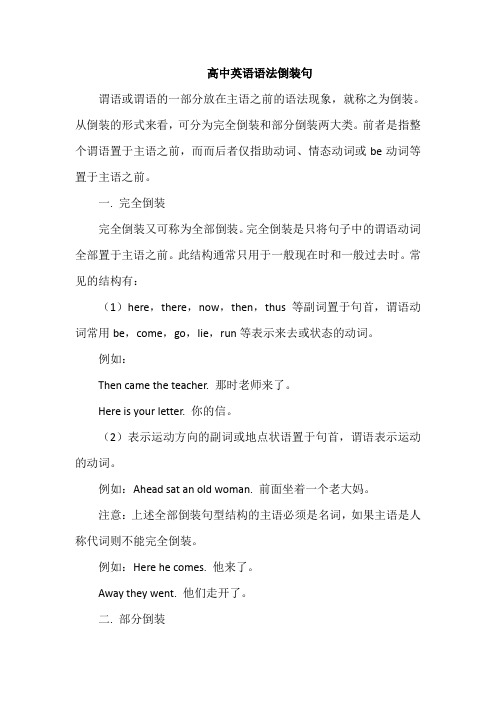
高中英语语法倒装句谓语或谓语的一部分放在主语之前的语法现象,就称之为倒装。
从倒装的形式来看,可分为完全倒装和部分倒装两大类。
前者是指整个谓语置于主语之前,而而后者仅指助动词、情态动词或be动词等置于主语之前。
一. 完全倒装完全倒装又可称为全部倒装。
完全倒装是只将句子中的谓语动词全部置于主语之前。
此结构通常只用于一般现在时和一般过去时。
常见的结构有:(1)here,there,now,then,thus等副词置于句首,谓语动词常用be,come,go,lie,run等表示来去或状态的动词。
例如:Then came the teacher. 那时老师来了。
Here is your letter. 你的信。
(2)表示运动方向的副词或地点状语置于句首,谓语表示运动的动词。
例如:Ahead sat an old woman. 前面坐着一个老大妈。
注意:上述全部倒装句型结构的主语必须是名词,如果主语是人称代词则不能完全倒装。
例如:Here he comes. 他来了。
Away they went. 他们走开了。
二. 部分倒装部分倒装是指将谓语的一部分如助动词或情态倒装放到主语之前。
如果句子的谓语没有助动词或情态动词,则需添加助动词do,does 或did,并将其置于主语之前。
(1)句首为否定或半否定的词语,如no, not, never, seldom, little, hardly, at no time, in no way, not until…等。
例如:Never have I seen such a performance.从未见过如此糟糕的表演。
Nowhere will you find the answer to this question.无论如何你不会找到这个问题的答案的。
Not until the child fell asleep did the mother leave the room.母亲一直到孩子入睡后才离开房间。
高三英语倒装句知识点
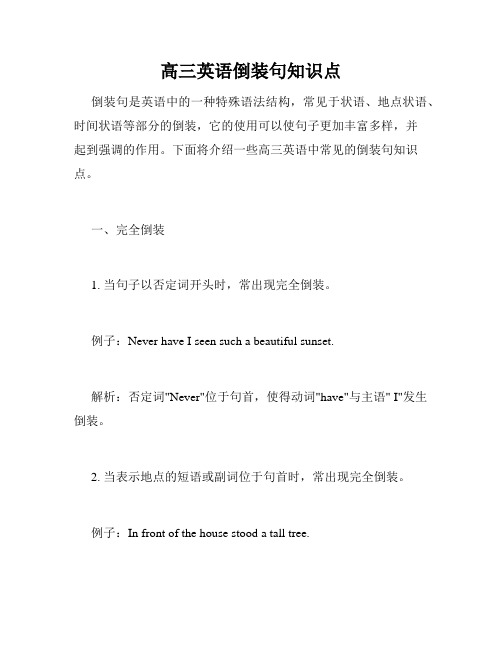
高三英语倒装句知识点倒装句是英语中的一种特殊语法结构,常见于状语、地点状语、时间状语等部分的倒装,它的使用可以使句子更加丰富多样,并起到强调的作用。
下面将介绍一些高三英语中常见的倒装句知识点。
一、完全倒装1. 当句子以否定词开头时,常出现完全倒装。
例子:Never have I seen such a beautiful sunset.解析:否定词"Never"位于句首,使得动词"have"与主语" I"发生倒装。
2. 当表示地点的短语或副词位于句首时,常出现完全倒装。
例子:In front of the house stood a tall tree.解析:地点短语"In front of the house"位于句首,使得动词"stood"与主语" a tall tree"发生倒装。
3. 当表示方向的副词放在句首时,常使用完全倒装。
例子:Down the street ran the little boy.解析:副词"Down"置于句首,使得动词"ran"与主语" the little boy"发生倒装。
二、部分倒装1. 当句子以表示否定的副词或短语开头时,常出现部分倒装。
例子:Not only did she pass the exam, but she also got the highest score.解析:否定副词"Not only"位于句首,使得助动词"did"与主语"she"发生倒装。
2. 当使用含有比较级的状语从句时,常出现部分倒装。
例子:The harder you work, the more progress you will make.解析:状语从句"the harder you work"中的主谓发生倒装。
- 1、下载文档前请自行甄别文档内容的完整性,平台不提供额外的编辑、内容补充、找答案等附加服务。
- 2、"仅部分预览"的文档,不可在线预览部分如存在完整性等问题,可反馈申请退款(可完整预览的文档不适用该条件!)。
- 3、如文档侵犯您的权益,请联系客服反馈,我们会尽快为您处理(人工客服工作时间:9:00-18:30)。
• (注:Hardly/Scarcely/Rarely had sb done sth when…No sooner had sb done sth than…) • 我刚躺下又睡着了。 • No sooner had I lain down than I fell asleep. • Hardly had I lain down when I fell asleep.
• 在so…that, such…that的结果状语从句中,当so, such位于句首时,需要倒装。
• He studied so hard that he got high marks in the test. • So hard did he study that he got high marks in the test. • He is such a clever boy that all the teachers like him. • Such a clever boy is he that all the teachers like him. • 她是如此激动以至于说不出话来。 • So excited was she that she couldn’t say a word.
• • • • • • •
哪儿都找不到钥匙。 The key was nowhere to be found. Nowhere was the key to be found. 我绝不会讲这个秘密告诉她的。 By no means shall I tell her the secret. 我们决不放弃希望。 Under no circumstances should we give up hope.
• 当so, neither/nor位于句首,表示“也…”或“也不…” 时需要倒装。 • 他父亲是出租车司机,他也是。 • His father is a taxi driver. So is he. • 我从来没有去过国外,我父母也没有。 • I have never been abroad before, and neither/nor have my parents. • 注:1)当so表示对上文的认同,意为“确实如此” 时,需要正常语序。 • 他会说法语。是的,他的确会法语,我也会。 • He can speak French. So he can and so can I. • 2)表示与上文提到的两种情况都一样,用So it is/was with…结构。 • 我从未去过欧洲,但我去过非洲。我兄弟也是如此。 • I have never been to Europe but I have been to Africa. So it is with my brother.
• 让步状语从句中as和though的倒装。 1) 表语(名词、形容词)+as+主语+动词 • 尽管格林先生年纪大了,但他仍旧强壮。 • Old as Mr Green is, he is strong. • 他虽然只是个孩子,但却很懂人情世故。 • Child as he is, he knows a lot about the world. • 注:名词提前时,前面的冠词要去掉。 • 2) 副词+as+主语+动词 • 尽管他学习努力,但也通不过考试。 • Hard as he studies, he can’t pass the exam. • 3) 动词+as+主语+情态动词 • 不管她多么尽力,都不能按时完成。 • Try as she may, she can’t finish it on time.
• 句首为含有否定意义的副词、介词短语或连词, 如:never, little, seldom, rarely, hardly, barely, scarcely, nowhere, in no way, by no means, in no case, on no account, under no circumstances, no sooner, not until, not only等。 • I have never seen such a terrible accident. • Never have I seen such a terrible accident. • He knows little does the importance of study. • Little does he know the importance of study. • His mother seldom comes back so late. • Seldom does his mother come back so late.
• Not until • 直到那时他才明白母亲那样做是为他好。 • Not until then did he know his mother had done it for his good. • 直到老师来了我们才离开。 • We didn’t leave until the teacher came. • Not until the teacher came did we leave. • (注:not until放句首,从句不倒装,主句倒 装) • Not only • 我不但认识她,而且还是她的朋友。 • Not only do I know her, but I am also her friend. (注:not only+倒装,but also+不倒装 neither+倒装,nor+倒装)
• 完全倒装(Complete Inversion) • 结构:提前部分+谓语动词+主语
同济一附中
• 将状语here, there, now, then前移,谓语 动词一般为be, come, go。 • There goes the bell. Let’s begin our class. • Here comes the bus. • Here are some examples. 。 • Now comes my turn to speak. • 注:当主语为人称代词时不引起倒装。 • Here comes he. × Here he comes. √ • 你在找书吗?在这儿呢。 • Aren’t you looking for your book? Look, here it is.
• 表示位置转移的副词,如up, down, in, out, away, ahead等移至句首。 • The eagle flew down.Down flew the eagle. • The rocket went up. Up went the rocket. Out rushed a lion. • A lion rushed out. • 门开了,进来了一个老人 • The door opened and in came an old man. • 注:当主语为人称代词时不引起倒装。 • Away they went. • Higher and higher it flew.
• • • •
•
• • •
Only+状语放在句首 Only then did I realize the trouble he was in. Only in this way can he relieve his sadness. Only by working hard will you be able to succeed. 一个人只有在离开家时才意识到家庭的温暖。 Only when one is away from home does one realize how nice home is. 注:only修饰主语,放在句首时不倒装。 我们只有一些人能说好英语。 Only some of us can speak English well.
• 句首状语为表示地点的介词词组,“地点状语 +谓语+主语” • A high monument stands in the center of the square • In the center of the square stands a high monument. • Rows of trees were on either side of the road. • On either side of the road were rows of trees. • 大门旁站着一名卫士。 • By the gate stood a guard.
• 把作为表语的形容词、副词、现在分 词、过去分词结构位于句首,“表语+ 系动词+主语”。 • Seated on the grass are a group of nice girls. • Lying about on the floor are books and magazines.
• 部分倒装(Partial Inversion) • 结构:提前部分+情态动词、助动词或be动 词+主语+(主要动词)
• 部分方式副词或频度副词放在句首,如: well, often, many a time, once in a while 等。 • 他时常提醒我不要那样做。 • Often did he remind me not to do it. • 他多次给我忠告。 • Many a time has he given me good advice • 那个日子我记忆犹新。 • Well do I remember the day.
